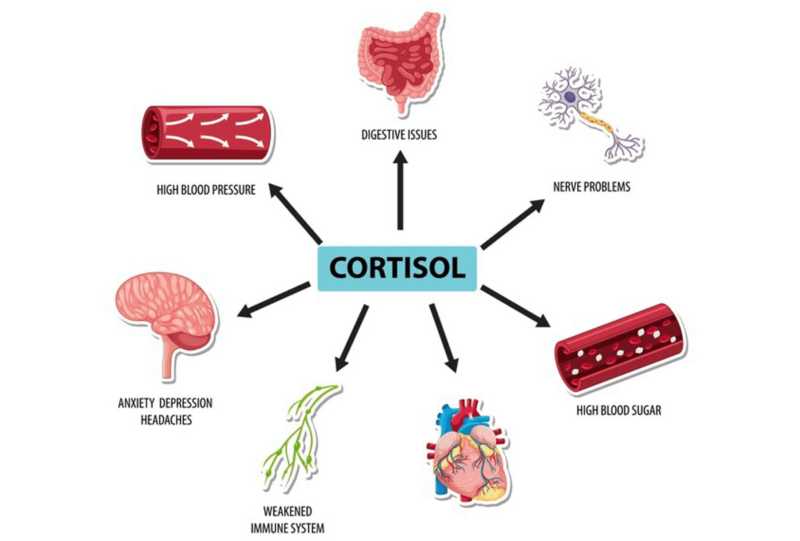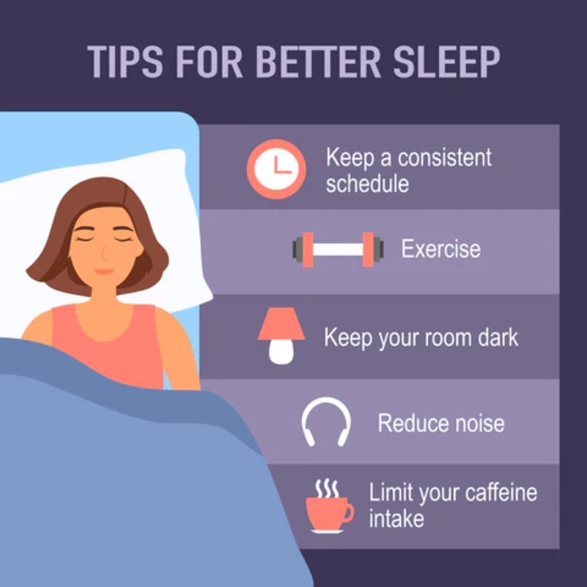Understanding the Relationship Between Work Stress, Overeating, and Quality Sleep
Jun 14, 2024 By Madison Evans
Stress at work can cause changes in your eating habits and overall well-being. This article explores the link between stress, overeating, and how important good sleep is for preventing these negative effects of stress on health.
Understanding the Role of Cortisol
Cortisol, frequently called stress hormone, plays an important part in managing metabolism and balancing energy. When we encounter stressful situations, cortisol levels increase and this tells our body to eat more so that it can restore its energy reserves. But when there is too much stress for a long time, it can disturb the control of cortisol. This might cause ongoing overeating which leads to gaining weight continually. Managing stress levels is crucial for maintaining a healthy relationship with food.

Additionally, cortisol does not just affect hunger but also impacts the place in the body where fat is stored. When a person has high levels of cortisol, usually due to long-term stress, there can be more fat deposited around their abdomen which brings about serious health problems. This highlights how crucial it is to manage stress for both controlling excessive eating and keeping a balanced body composition.
- Consideration: Incorporating stress-reducing activities such as regular exercise can help lower cortisol levels and mitigate its impact on appetite and weight.
- Caution: Avoid relying on comfort foods high in sugar and fat to cope with stress, as this can perpetuate the cycle of overeating and worsen health outcomes.
Impact of Sleep Quality on Eating Behaviors
Sleep is very important for our general health, and it even helps us keep good eating habits. When we sleep enough, it assists in balancing the hormones that control appetite such as leptin and ghrelin. If you don't get enough sleep, your body will create more of the hormone ghrelin which makes you feel hungry; at the same time reducing levels of leptin. This is what tells us when we are full of food (leptin). This difference might cause more hunger and desire, making it harder to resist unhealthy food selections.
Also, not enough sleep does more than just mess up hormone regulation. It also interrupts the body's normal circadian rhythms or biological clock that controls many different body functions including metabolism. When these natural cycles are disturbed it can lead to changes in eating habits and higher chances for weight issues like obesity and metabolic problems.
- Fact: Studies have shown that even a single night of poor sleep can disrupt appetite-regulating hormones, leading to increased calorie intake the following day.
- Noteworthy: Creating a sleep-friendly environment, such as keeping the bedroom dark and cool, can enhance sleep quality and support healthy eating behaviors.
The Link Between Stress, Sleep, and Overeating
Stress from work can affect sleep, leading to a harmful loop of bad sleep and excess eating. When people don't get good sleep due to stress-related insomnia or restless nights, their hormone balance becomes worse for them to control their eating habits. Also, when sleep isn't good quality it decreases thinking and control over impulses; this makes it more difficult not only for individuals to choose healthy foods but also to avoid other temptations such as snacks late at night.
Not only do hormonal alterations affect how we handle stress, but also the emotional burden of chronic tension can make maladaptive coping methods more probable. For instance, stress often causes a desire for high-calorie foods and at the same time, lack of sleep weakens self-control. This combination might result in an ongoing loop where one's stress is fed by poor sleeping habits and overeating.
- Consideration: Practicing relaxation techniques before bedtime, such as progressive muscle relaxation or visualization exercises, can help alleviate stress and promote better sleep.
- Noteworthy: Establishing a consistent sleep schedule, even on weekends, can help regulate circadian rhythms and improve sleep quality over time.
Strategies for Managing Work Stress and Promoting Quality Sleep

To lower the influence of work stress on eating behaviors and sleep quality, it's crucial to apply stress control methods and develop good sleep practices. Perform relaxation activities like deep breaths, meditation, or yoga to decrease stress levels during the day. Set up a regular sleeping timetable and formulate a calming night routine for improved sleep hygiene. Avoid caffeine, electronics, and stimulating activities before bedtime to ensure restful sleep.
Doing regular exercise can also assist in decreasing stress and enhancing the quality of your sleep. Research has demonstrated that physical activity reduces cortisol levels and boosts the production of endorphins, which are natural chemicals in our brains that act as stress reducers. Participating in activities you like, like walking around, dancing or gardening might aid with managing stress and promoting improved sleep.
- Consideration: Avoid vigorous exercise close to bedtime, as it may have a stimulating effect and make it harder to fall asleep.
- Caution: Be mindful of screen time before bed, as exposure to blue light from electronic devices can disrupt the body's natural sleep-wake cycle. Consider using blue light filters or switching to dim lighting in the evening to signal to your body that it's time to wind down.
Seeking Professional Help
In case work stress keeps affecting eating habits and sleeping well even when trying to handle it yourself, it is good to get professional help from a therapist or health care provider. Cognitive-behavioral therapy (CBT) can assist individuals in creating coping methods for dealing with stress and enhancing their sleep routines. A dietitian who is registered might offer custom guidance on nutrition and mindful eating methods that could assist people in maintaining a balanced lifestyle for their general health and wellness.
Therapy methods like mindfulness-based stress reduction (MBSR) or cognitive-behavioral therapy for insomnia (CBT-I) could help because they focus on the root reasons behind stress and sleep problems. These methods use proven knowledge to aid people in recognizing and changing negative thinking patterns and actions that lead to overeating and low-quality sleep.
- Fact: CBT is effective in treating both stress-related eating disorders and insomnia by addressing the cognitive and behavioral factors that perpetuate these conditions.
- Noteworthy: Integrating therapy or counseling into your wellness routine can provide ongoing support and guidance as you work towards improving your relationship with food and sleep.
Conclusion
Stress from work can affect how people eat and sleep, causing them to overeat and gain weight. Yet, if they focus on ensuring good sleep habits while using stress control methods as well, these impacts may be lessened. When we comprehend the link between work tension, excessive eating, and sound sleeping; it becomes possible for people to take preventive measures to improve their health condition overall.







